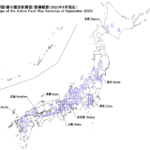2023-09-26 スイス連邦工科大学ローザンヌ校(EPFL)
◆この技術は、極めて精密な光学回路の整列に適用でき、量子光学システムの組み立てなどの用途が検討されています。新しいフェムト秒レーザーは小さいですが、高い出力と短いパルスを生成し、将来的に商業製品になる可能性があります。
<関連情報>
- https://actu.epfl.ch/news/making-a-femtosecond-laser-out-of-glass/
- https://opg.optica.org/optica/fulltext.cfm?uri=optica-10-10-1269&id=540082
- https://opg.optica.org/optica/fulltext.cfm?uri=optica-3-12-1285&id=353579
オールガラス製の小型GHz繰り返しフェムト秒レーザー共振器 All-glass miniature GHz repetition rate femtosecond laser cavity
Antoine Delgoffe, Saood Nazir, Sargis Hakobyan, Clemens Hönninger, and Yves Bellouard
Optica Published: September 25, 2023
DOI:https://doi.org/10.1364/OPTICA.496503
Abstract
Free-space optics allows for design freedom and control, but miniaturization and manufacturability are limited. Here, we present a method for manufacturing complex miniaturized free-space optical systems that combines contactless femtosecond laser-activated alignment with femtosecond laser 3D manufacturing of a substrate incorporating optomechanical elements. Specifically, we demonstrate a palm-sized, all-glass GHz femtosecond laser cavity, whose alignment and lasing operation are permanently tuned in a contactless manner via laser–matter interaction using another femtosecond laser. The manufactured Yb:KYW oscillator shows self-starting mode-locking with a diffraction-limited beam and outputs a stable train of solitons with 182 fs pulse width at 1.0925 GHz repetition rate, for 725 mW incident pump power.
フェムト秒レーザー照射による石英の応力状態操作 Stress-state manipulation in fused silica via femtosecond laser irradiation
Yves Bellouard, Audrey Champion, Benjamin McMillen, Sebabrata Mukherjee, Robert R. Thomson, Charles Pépin, Philippe Gillet, and Ya Cheng
Optica Published: November 7, 2016
DOI:https://doi.org/10.1364/OPTICA.3.001285
Abstract
Controlling the stress in glass after laser exposure is of prime importance not only for photonics applications, but also for preserving the mechanical integrity of glass components in general. The sub-surface exposure of fused silica to femtosecond laser pulses can induce a permanent and localized modification to the glass structure. In this work, we present evidence that femtosecond laser exposure can be used to continuously tailor the stress in the material, from a tensile to compressive state, as the laser pulse energy is changed. In addition, we demonstrate that this effect can not only be obtained while transitioning between different laser-induced microstructures, but also at low pulse energy, in the laser exposure regime particularly relevant for fabricating waveguides. These results demonstrate that femtosecond laser exposure is a versatile tool for fully controlling the stress landscape in a volume of silica, opening up new technological opportunities, like for instance, direct write stress-free waveguides, direct-write stress-induced birefringence state or mechanically reinforced parts, by locally preloading it.



